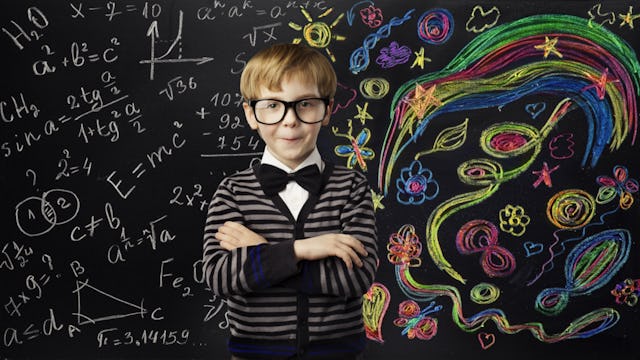We All Should Be Fighting To Keep Arts Education In Schools

I graduated from high school near the top of my class. I took AP classes, was involved in numerous school activities, and won academic scholarships. Four years later, I graduated magna cum laude from a selective private college. I’ve never had trouble finding or keeping a job, and I’ve had my fair share of honors in the professional world.
I don’t share all of that to brag, but rather to illustrate that I could be the poster child for a successful education. And if you were to ask me which class I found most valuable out of all that educational rigor?
Drama. Hands down.
I was always a shy kid. I loved the theater, though, so I got involved in choir and drama. Learning to perform brought me out of my shell in a way that I can’t imagine happening any other way. I found my voice through the performing arts, and though I didn’t go on to a career in that field, I’ve used the skills I gained from it practically every day of my adult life.
My siblings also built their lives through the arts. My older brother is an art teacher, and my younger brother is the in-game cinematic project director for World of Warcraft at Blizzard Entertainment. They both also play multiple musical instruments. Perhaps artistic interest and talent just runs in the family, but I credit a great deal of my and my siblings’ collective life’s work to the outstanding arts education we received throughout our formative years.
So when I hear of schools cutting arts programs, a piece of me dies inside. I know schools have to prioritize within budget restraints, but I truly believe that arts education should be one of the last things to go if a school is short on funds. I’m serious.
If we’re talking about which classes have the greatest overall benefit for the greatest number of kids, the arts must rank near the top of that list. Research has shown that kids who received arts education develop skills that lead to success later on in life, such as motivation to achieve, an understanding that hard work helps improve knowledge and ability, and tolerance for other viewpoints. Arts help counteract the effects of trauma by lowering stress levels and giving kids outlets for expression — an important consideration when schools in low-income areas find themselves having to cut art programs. The creative endeavors offered through arts education help broaden kids’ minds and encourage innovation which is a crucial quality in today’s business world.
However, the ways in which the arts help with academic and professional success are simply bonuses in my book. The truth is that the arts are worthy of time, study, and money in their own right. Why do we have to prove that they are helpful in some other capacity in order for them to be seen as valuable, as if they are merely a catalyst and not an event in and of themselves? Do people not watch movies? Go to plays? Listen to music? Display art in their homes? Read books with illustrations?
Literally everyone does those things, and the arts are what make those things possible. It’s absolutely silly that we have to defend the value of an entire focus of interest and achievement that has been part of the human experience forever.
In fact, the arts were not just included, but were the main focus of education in ancient Athens — a society credited as the birthplace of democracy, for crying out loud. I actually wonder how much that educational focus contributed to those democratic ideals. As high school art teacher Tim Gregory writes:
“In an education system built on conformity and getting the ‘right’ answer in order to achieve on standardized testing, arts education offers many individualized ‘right’ answers. Right answers that help students explore themselves and their own ideas through the means of expression. This can help eliminate anxiety due to competition with classmates and helps foster a “learning community” in which students can share ideas and help each other problem solve. This reaches beyond the classroom into society, helping students to become citizens who interact with their communities in a cooperative and creative way.”
Bam. Right there. To me, that may be the biggest benefit of arts education: making better citizens. Isn’t that the purpose of public education? To improve the lives of our communities as a whole?
Our kids deserve the richest educational experience we can offer them, and our world deserves kids with the inspiration and innovation to bring their own richness to it. The arts are far more than the fluff electives some people believe them to be. They are a main course, and we should be fighting like hell to keep them on the table for all kids.
This article was originally published on